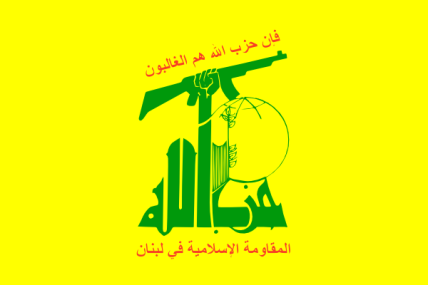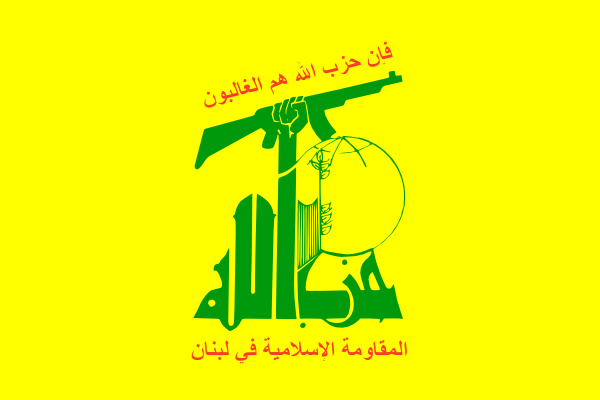
Hezbollah flag which reads “Hezbollah shall be triumphant…Islamic Resistance in Lebanon.”
“Hezbollah (Party of God) shall be triumphant” (فإن حزب الله هم الغالبون) as their slogan says. But triumphant over who?
Throughout the years, Hezbollah’s raison d’être has expanded and contracted with the fluctuating winds of its geopolitical, strategic, confessional and pan-Arab interests. With this, the targets of its rage have also varied, winning it die-hard supporters in some and solid enemies in others. But today, in addition to taking it upon itself to free Lebanon from Israeli occupation (itself questionable after Israel’s 2000 withdrawal), Palestine from Israeli occupation and maintain itself as one of the sole repositories of Arab struggle and dignity, an unexpected new enemy has come to grab its attention. The enemy is in Syria, not Syria; battling the people, not the regime: this is Hezbollah’s new front line.
This time, Hezbollah doesn’t stand on the side of the oppressed, but the oppressor. It doesn’t stand on the side of the people, but of an oligarchy that gained popular support through force and nepotism. It stands against much of what it purportedly stands for, with irreversible consequences on its structure, ideological foundations, military strength and place in Lebanon’s ever-evolving political landscape.
Hezbollah’s involvement in Syria is no longer a question of whether or where? Confirmations have come from many sources, including from Hassan Nasrallah himself, specifying if only Al Qusayr and the surroundings of the Sayida Zeinab shrine as locations of Hezbollah’s presence. Involvement has also gone beyond questioning why Hezbollah is taking part in the increasingly brutal and bloody civil war. Reasons range and are often a mixture of defending its ally the Syrian regime, partly out of its own volition and partly as a proxy for Iran in its struggle with Israel and the West, as well as part of the ongoing Shia-Sunni (of which most of the Syrian opposition is made of and supported by regionally) confrontation, exacerbated by the ever-growing presence of radical Sunni takfiri Islamists across the border. Involvement has also become an instinctive war of survival for Hezbollah, for who can forget the pivotal role the Assad regime has played in supporting Hezbollah’s existence and guaranteeing its strength during the past two decades.
Thus today, the question is what comes next? What will victory for Hezbollah look like in Syria and how will it be translated in Lebanon? What will Hezbollah’s martyrs in Syria have died for and what is now the holy promise the party will have fulfilled in fighting to protect the Assad regime? How does its involvement in Syria differentiate it from the Lebanese Sunni involvement (whether that of former Prime Minister Hariri through his minion MP Okab Sakr or that of wannabe Sunni leader Ahmad Al Assir, both to be equally condemned) other than turning Syria into yet another battlefield, this time for Lebanese Sunni-Shia confrontation with potentially disastrous consequences on Lebanon.
Hezbollah’s tone remains defiant, regardless of the fact that its battle in Syria has not a fraction of the legitimacy it has in facing Israel and puts an entire country in the line of fire. It remains defiant, and seemingly in denial that it has allowed itself to be dragged into a battle with no future, for Assad will eventually collapse. It remains defiant despite the hypocrisy in supporting other Arab uprisings in Tunisia, Egypt and Bahrain, while being adamantly against the one in Syria solely because it targets the Assad regime. It is true that the Syrian uprising has developed into a civil war, far from its initially secular and progressive objectives and extreme Sunni elements are a major cause for concern, but this turn of events isn’t something up to Hezbollah to reverse and fight against today.
Since the 2006 July War with Israel, Hezbollah’s trajectory has been an uphill battle to maintain its unquestionable status as a political party-militia, having been subcontracted the defence of a country on its own terms. It has clashed with its internal opponents and turned its weapons toward them, despite assurances that its weapons were only aimed at the Israeli enemy. Internal opponents must share part of the blame for this, erroneously trying to face a mighty party with threats of destruction at the stroke of a pen. But today, Hezbollah refuses to retreat and drowns itself in yet another battlefield with much to loose for itself, its supporters and more importantly for Lebanon.
Even after all these years, Hezbollah’s loyal and unconditional ally may be the only one able to slowly bring the party to its knees, if only as the undefeated resistance movement it has portrayed itself to be. Triumph for who shall it be this time?
Written by Marina Chamma




